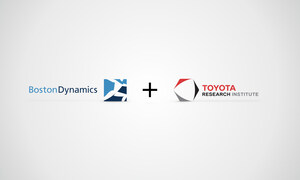Toyota Research Institute Invests Over $100M in Collaborative Research Program with U.S. Universities
Partnerships with MIT, Stanford, Columbia, and others address some of the world's greatest challenges, including aging society, climate change, and human understanding
LOS ALTOS, Calif., May 15, 2023 /PRNewswire/ -- Toyota Research Institute (TRI) today announced the latest results of its collaborative research program with U.S. academic institutions. This initiative has funded $100M of research and generated over 1250 paper submissions since its inception in 2016, making it one of the largest collaborative research programs by an automotive company in the world.
The program expanded during 2022 to include 21 university partners and 61 projects focused on energy and materials, human-centered artificial intelligence, human interactive driving, machine learning, and robotics.
"We are deeply satisfied with the results of our partnerships with this outstanding group of institutions and researchers," said Eric Krotkov, who leads the university research program. "We believe that collaboration is the key to tackling society's biggest challenges and are confident that this program will continue to achieve new breakthroughs."
Each project consists of a TRI researcher working with a university team in a close collaboration bridging academia and industry.
"TRI's collaborations with universities bring a wealth of knowledge and new ideas to our research efforts," said Brian Storey, senior director of energy and materials at TRI. "This program both helps us create innovative technologies and fosters the next generation of innovative leaders."
The last year alone saw three papers win awards at the Robotics: Science and Systems Conference (RSS). Some project highlights from the program include:
Advanced Robotic Capabilities
The Columbia Artificial Intelligence and Robotics (CAIR) Lab led by Computer Science Assistant Professor Shuran Song partnered with TRI to develop robotic capabilities that can handle deformable, non-rigid objects that can fold, bend, and change shape. These advancements were successfully tested by having robots fold laundry and manipulate flexible bags. Her team won a Best Paper Award at RSS 2022 for developing an algorithm called the Iterative Residual Policy (IRP), a general learning framework for repeatable tasks with complex dynamics.
"Working with TRI has been an incredible experience. The partnership has allowed us to leverage industry-level resources, which have been critical in driving our research forward," said Shuran Song. "I am honored to have the opportunity to work with such a great team, and I am excited to see what we can accomplish together in the future."
Fuel Cell Catalyst Durability
Both hydrogen fuel cell vehicles and hydrogen electrolyzers require catalyst materials that utilize expensive and rare elements such as platinum and iridium. A long-standing challenge is to find replacement materials that use more abundant elements. However, all proposed alternatives don't last long in an operating environment before they dissolve. The laboratories led by Professor Thomas Jaramillo at Stanford University and Associate Scientist Michaela Burke Stevens at the Stanford Linear Accelerator Center (SLAC) are working with TRI researchers to create data-driven theories of catalyst durability by using a novel experimental technique that enables real-time measurement of even the smallest amounts of dissolving materials.
Computational Governor
Professor Ilya Kolmanovsky's research team at the University of Michigan developed a governor architecture that could be used to speed up the execution time of a model predictive control (MPC) control system solution. TRI researchers collaborated on and took inspiration from this project to create a solution for Toyota Motors that solves a vehicle controller problem where sudden changes to setpoints would cause unresponsiveness.
"I believe our project is an exemplar of how TRI combines industry and academic knowledge, expertise, and capabilities to develop solutions that ultimately lead to real-world impact," said Ilya Kolmanovsky. "This is, without any doubt, one of the best research collaborations that I have ever had."
TRI plans to continue the program into 2024 with new additional high-risk, high-reward projects to accelerate the development of key technologies for Toyota.
Learn more about TRI's research efforts on Medium.
About Toyota Research Institute
Toyota Research Institute (TRI) conducts research to advance energy and materials, human-centered artificial intelligence, human interactive driving, machine learning, and robotics. Led by Dr. Gill Pratt, TRI's team of researchers are developing technologies to amplify human ability, focused on making our lives safer and more sustainable. Established in 2015, TRI has offices in Los Altos, California, and Cambridge, Massachusetts. For more information about TRI, please visit http://tri.global.
TRI Media Contact:
Wendy Rosen
Senior Director of Communications
[email protected]
SOURCE Toyota Research Institute

WANT YOUR COMPANY'S NEWS FEATURED ON PRNEWSWIRE.COM?
Newsrooms &
Influencers
Digital Media
Outlets
Journalists
Opted In






Share this article